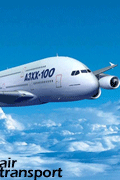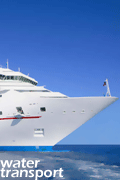Monday, March 9, 2009
Entry, training, and educational requirements for many water transportation occupations are established and regulated by the U.S. Coast Guard. Most officers and operators of commercially operated vessels must be licensed by the Coast Guard, which offers various kinds of licenses, depending on the position, body of water, and type of vessel. Individuals must be relicensed when they change the type of ship or the body of water they are on.
Education and training
Entry-level workers are classified as ordinary seamen or deckhands. Workers take some basic training, lasting a few days, in areas such as first aid and firefighting.
There are two paths of education and training for a deck officer or an engineer: applicants must either accumulate thousands of hours of experience while working as a deckhand, or graduate from the U.S. Merchant Marine Academy or another maritime academy. In both cases, applicants must pass a written examination. It is difficult to pass the examination without substantial formal schooling or independent study. The academies offer a 4-year academic program leading to a bachelor-of-science degree, a license (issued only by the Coast Guard) as a third mate (deck officer) or third assistant engineer (engineering officer), and, if the person chooses, a commission as ensign in the U.S. Naval Reserve, Merchant Marine Reserve, or Coast Guard Reserve. With experience and additional training, third officers may qualify for higher rank. Generally officers on deep water vessels are academy graduates and those in supply boats, inland waterways, and rivers rose to their positions through years of experience.
Harbor pilot training usually consists of an extended apprenticeship with a towing company or a habor pilots association. Entrants may be able seamen or licensed officers.
Licensure
Coast Guard licensing requirements vary by occupational specialty, type of vessel, and by body of water (river, inland waterway, Great Lakes, and oceans.) The requirements increase as the skill level of the occupational specialty increases and the size of the vessel increases.
Entry level seamen or deckhands on vessels operating in harbors or on rivers or other waterways do not need a license. All others working on larger, ocean-going vessels do need a license. To get the basic entry level license, workers must pass a drug screen, take a medical exam, and be U.S. citizens.
Workers on ocean-going or Great Lakes vessels need specialty licenses to work as engineering officers, or deck officers. On rivers or inland waterways, only the captain or anyone who steers the boat needs a license. For more information on licensing requirements see the Coast Guard's Web site listed in the sources of additional information. Radio operators are licensed by the Federal Communications Commission.
Other qualifications. Most positions require excellent health, good vision, and color perception. Good general physical condition is needed because many jobs require the ability to lift heavy objects, withstand heat and cold, stand or stoop for long periods of time, dexterity to maneuver through tight spaces, and good balance on uneven and wet surfaces and in rough water.
Advancement
Experience and passing exams are required to advance. Deckhands who wish to advance must decide whether they want to work in the wheelhouse or the engine room. They will then assist the engineers or deck officers. With experience, assistant engineers and deck offices can advance to become chief engineers or captains. On smaller boats, such as tugs, a captain may choose to become self-employed by buying a boat and working as an owner-operator.
Education and training
Entry-level workers are classified as ordinary seamen or deckhands. Workers take some basic training, lasting a few days, in areas such as first aid and firefighting.
There are two paths of education and training for a deck officer or an engineer: applicants must either accumulate thousands of hours of experience while working as a deckhand, or graduate from the U.S. Merchant Marine Academy or another maritime academy. In both cases, applicants must pass a written examination. It is difficult to pass the examination without substantial formal schooling or independent study. The academies offer a 4-year academic program leading to a bachelor-of-science degree, a license (issued only by the Coast Guard) as a third mate (deck officer) or third assistant engineer (engineering officer), and, if the person chooses, a commission as ensign in the U.S. Naval Reserve, Merchant Marine Reserve, or Coast Guard Reserve. With experience and additional training, third officers may qualify for higher rank. Generally officers on deep water vessels are academy graduates and those in supply boats, inland waterways, and rivers rose to their positions through years of experience.
Harbor pilot training usually consists of an extended apprenticeship with a towing company or a habor pilots association. Entrants may be able seamen or licensed officers.
Licensure
Coast Guard licensing requirements vary by occupational specialty, type of vessel, and by body of water (river, inland waterway, Great Lakes, and oceans.) The requirements increase as the skill level of the occupational specialty increases and the size of the vessel increases.
Entry level seamen or deckhands on vessels operating in harbors or on rivers or other waterways do not need a license. All others working on larger, ocean-going vessels do need a license. To get the basic entry level license, workers must pass a drug screen, take a medical exam, and be U.S. citizens.
Workers on ocean-going or Great Lakes vessels need specialty licenses to work as engineering officers, or deck officers. On rivers or inland waterways, only the captain or anyone who steers the boat needs a license. For more information on licensing requirements see the Coast Guard's Web site listed in the sources of additional information. Radio operators are licensed by the Federal Communications Commission.
Other qualifications. Most positions require excellent health, good vision, and color perception. Good general physical condition is needed because many jobs require the ability to lift heavy objects, withstand heat and cold, stand or stoop for long periods of time, dexterity to maneuver through tight spaces, and good balance on uneven and wet surfaces and in rough water.
Advancement
Experience and passing exams are required to advance. Deckhands who wish to advance must decide whether they want to work in the wheelhouse or the engine room. They will then assist the engineers or deck officers. With experience, assistant engineers and deck offices can advance to become chief engineers or captains. On smaller boats, such as tugs, a captain may choose to become self-employed by buying a boat and working as an owner-operator.
posted by transport blogs
@ 8:55 PM
permanent link | Post a Comment
|
![]()









